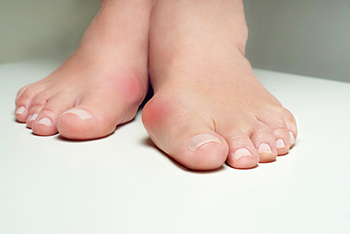 A bunion forms when bones in the front of the foot move and the big toe leans inward towards the smaller toes. The result of this process is a bony bump on the joint at the base of the big toe. The skin over the bump or bunion may be swollen, painful, and red and movement of the big toe may be limited. Bunions are often formed by the inherited structure of one’s foot, a foot problem or injury, or another physical condition, like arthritis. Tight, narrow shoes or high-heeled shoes can irritate bunions and aggravate all symptoms. Bunionettes are smaller bunions that form on the joint of the little toe. Because bunions can lead to other foot conditions, it is important to see a qualified podiatrist for proper diagnosis and treatment.
A bunion forms when bones in the front of the foot move and the big toe leans inward towards the smaller toes. The result of this process is a bony bump on the joint at the base of the big toe. The skin over the bump or bunion may be swollen, painful, and red and movement of the big toe may be limited. Bunions are often formed by the inherited structure of one’s foot, a foot problem or injury, or another physical condition, like arthritis. Tight, narrow shoes or high-heeled shoes can irritate bunions and aggravate all symptoms. Bunionettes are smaller bunions that form on the joint of the little toe. Because bunions can lead to other foot conditions, it is important to see a qualified podiatrist for proper diagnosis and treatment.
If you are suffering from bunions, contact Dr. Scott Peters of Ankle & Foot Walk-In Clinic. Our doctor can provide the care you need to keep you pain-free and on your feet.
What Is a Bunion?
A bunion is formed of swollen tissue or an enlargement of boney growth, usually located at the base joint of the toe that connects to the foot. The swelling occurs due to the bones in the big toe shifting inward, which impacts the other toes of the foot. This causes the area around the base of the big toe to become inflamed and painful.
Why Do Bunions Form?
Genetics – Susceptibility to bunions are often hereditary
Stress on the feet – Poorly fitted and uncomfortable footwear that places stress on feet, such as heels, can worsen existing bunions
How Are Bunions Diagnosed?
Doctors often perform two tests – blood tests and x-rays – when trying to diagnose bunions, especially in the early stages of development. Blood tests help determine if the foot pain is being caused by something else, such as arthritis, while x-rays provide a clear picture of your bone structure to your doctor.
How Are Bunions Treated?
- Refrain from wearing heels or similar shoes that cause discomfort
- Select wider shoes that can provide more comfort and reduce pain
- Anti-inflammatory and pain management drugs
- Orthotics or foot inserts
- Surgery
If you have any questions, please feel free to contact our office located in Mayfield Village, OH . We offer the newest diagnostic and treatment technologies for all your foot care needs.
